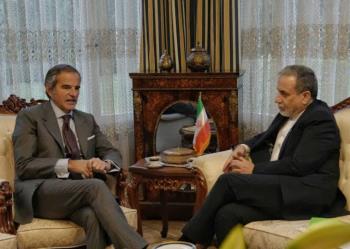Alwaght- Syrian Tourism Minister Mohammed Rami Martini visited Saudi Arabia to attend a tourism conference held on May 26-27.
The visit, coming at the invitation of the Saudi Tourism Ministry, was the first visit by a Syrian official 10 years after a devastating conflict hit the Arab country in 2011.
The visit of the Syrian delegation to Riyadh at this time was extremely important to most political observers, mainly because it took place in a situation when the Saudi government has pursued a policy of maximum opposition to the legitimate Syrian government over the past decade and spared no action to end the power of President Bashar al-Assad. Bouthaina Shaaban, the special advisor to the Syrian president, told Sham FM radio station that the trip marked a "positive step" and that a few years ago it was impossible.
The trip to Saudi Arabia of a top Syrian official highlights a significant change in the Saudi policies. But how is it of importance to Syria?
Legitimacy boost to Assad, his government
The first and perhaps paramount dimension of the importance of the visit to the Arab kingdom is the resultant prestige and credit for the legal Syrian government and President Assad himself. After 2011, many regional actors like Saudi Arabia and Turkey called on Assad to step down. They deemed "illegal" the presidential election in 2014.
In recent years, Arab countries spared no effort to overthrow the central Syrian government, either through inciting street riots or by supporting extremist groups on the battlefield. But in the current situation, Saudi officials seem to have realized their strategic mistakes in their vision of President Assad and his legitimate government over the past decade, and have now put on the agenda a strategy to de-escalate and normalize with Damascus. The Wednesday presidential election even adds to strengthening the legitimacy of the central government. In such atmosphere, a Syrian government official visit to Saudi Arabia will importantly expand Assad's legitimacy ground.
Syria-Arab world de-escalation goes inclusive
Although Saudi Arabia cannot be described as the undisputed leader of the Arab world, its policies and political behaviors at the regional level certainly have an undeniable impact on other countries. The Saudis have always influenced other Arab countries' foreign policy decisions because of their traditional special position as Sunni world leaders and also because of their petrodollar-powered influence. Given Riyadh's position, Saudi-Syrian de-escalation would mean whole Persian Gulf Arab states' normalization with Syria.
After nearly a decade of Arab monarchies' tensions with Damascus, the Arab world is reviewing its behavior to Syria as its maximum opposition policy has proven a failure. The Arab rulers clearly know that the Syrian government has moved past the period of urgency and a comprehensive crisis, and Assad ouster is no longer sensible. Therefore, in the new conditions, there is no path bypassing the thaw with the legitimate Syrian government.
Balance of power in West Asia changing, international actors losing regional role
The Arab uprisings that swept through West Asia and North Africa in 2011 were certainly influential in changing the balance of power in these two regions. In fact, the uprisings created a set of local, regional, and international polarizations, with the most important of them being Axis of Resistance vs. opponents— on the one side stood the Resistance camp members including Iran, Syria, Lebanon's Hezbollah, Iraq, and Yemen and on the other side stood the US, Europe, Saudi Arabia, the UAE, and the Israeli regime.
This polarization shaped the defining face of the balance of power in West Asia over the past decade, with Saudi Arabia and other Arab monarchies standing on the opposite side of Assad and Damascus. Nevertheless, Riyadh’s step towards de-escalation with Damascus should be seen as part of a broader pervasion of de-escalation in West Asia region. Definitely, de-escalation among such regional actors, if realized, can change the maneuvering field for the foreign actors, especially interventions by the US and the Israeli regime. This is the phenomenon that would transform the balance of power in West Asia and North Africa.



























